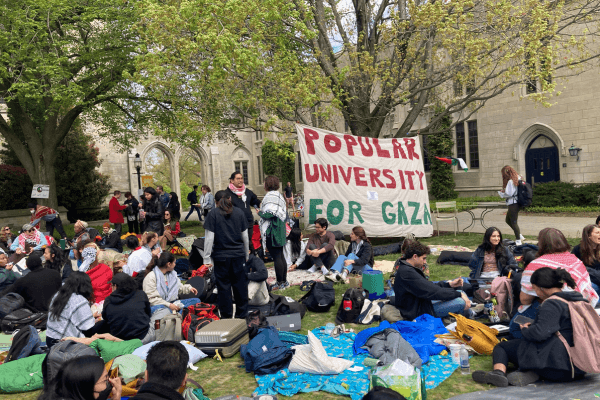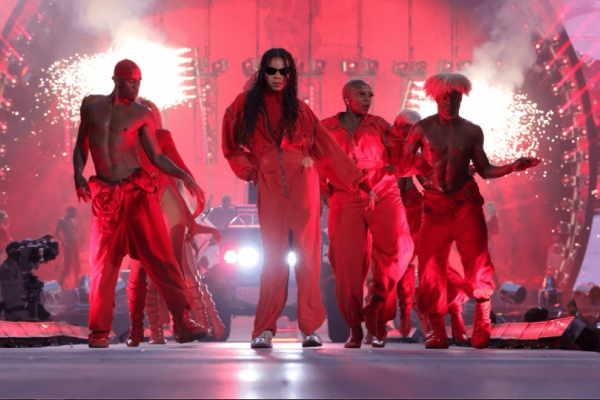There are moments when art marks a moment of change from which I can date my life — when the bigger truth I had not yet spoken could be recognized unfolding in front of me. Sometimes these truths, and these works, are so awake that they give me more life.
I think of seeing Disney’s Fantasia at 7 years old, and elevated-terrified by the scale and possibility of life itself; or reading Alice Walker’s The Color Purple and trusting that even the hardest circumstances can be redeemed, with healing for the survivors and mercy offered to the wrongdoers. And now there is Matthew Lopez’s play The Inheritance, currently on Broadway through mid-March, in which a century-old English novel (E.M. Forster’s Howards End) gently soundtracks, or perhaps orchestrates, the lives of gay men in their 30s during the period when President Obama was moving out of office, President Trump was moving in, and many of us wondered just where on earth we were.
The plot is not complicated: We’re here to watch a young man find himself. But the inner workings are vast: We’re really here to watch an entire generation learn who it really is, what its responsibilities are, its gifts, and on whose shoulders it stands.
A large cast functions as chorus and support, overseen by Forster (Paul Hilton, wizened, lonely, lovely), author of stories about externally privileged folk loosening themselves from the bonds of repression. Over the course of more than seven hours, we witness the story of Eric Glass (Kyle Soller, solid and vulnerable at the same time), mid-30s, an environmental activist privileged enough to live in a big apartment in a swanky part of New York City (but only because his Holocaust-surviving grandparents benefited from rent control) with his partner Toby Darling (Andrew Burnap, on fire), an annoyingly successful writer (whose ingratiating exterior is a predictable cover for immense tragedy, un-grieved, unresolved inside him like a hamster on a wheel he can’t escape). Eric is befriended by Walter (also Hilton), an older man with a papery frame, the weight of years of secret burden somewhat uncoiled by years of saintly service; partnered to Henry (I saw both John Benjamin Hickey and Tony Goldwyn in the role, each of them exquisite), the definition of clean-cut elite. They talk their way into mentoring each other — the older men showing the younger ones the price paid by their forebears during the first iteration of the AIDS crisis, the younger men helping the older men let go of the part of their own emotional restrictions that might be self-imposed. Then Leo (Samuel H. Levine — and if this show has a star, it’s him) shows up, a young man living homeless, doing sex work to survive, asking for help, and giving it.
With the energetic chorus (Jordan Barbour and Arturo Luís Soria are standouts), they weave and spar about politics, about sex and intimacy, sex and destruction, addiction, bigotry, suicide, depression, access to power, the superficiality of the art market, the role of unregulated capitalism in generating cures, the role of unaccountable capitalism in keeping those cures from the people who need them, the economic argument for supporting Trump, the moral argument for opposing him, the responsibility of privilege, racial disparities in wellbeing, who “owns” gay culture, who belongs, what love really means, when is the struggle for civil rights going to evolve into a civil society and civil decency by which we, simply, look after each other?
And do you know what the plague meant?
That men who loved men, who had already been forced to live in the shadows, to hide to limit discrimination or even just to stay alive, to be told that there were deviant or despicable or even demon possessed; when what they and we were was actually nothing more or less than the gift of loving? That these men, because of the silence and the hiding — generated by religious institutions and backed up by religious rhetoric and political power — started to get sick, started to die, and the public response often mingled disgust with — what shall we call it? — relief. That these men were dying was, in the minds of some people claiming to follow the carpenter from Nazareth, an act of God? “Peace comes dropping slow,” wrote W.B. Yeats; the evolution of decency among humans, too. Only last week, the most recent recipient of the Presidential Medal of Freedom was publicly mocking the love of one man for another. This must be balanced by the fact that that man, Pete Buttigieg, is the most prominent openly gay politician in U.S. history, and that Lindsey Graham, not exactly a paragon of progressive values, responded to Rush Limbaugh’s homophobia by calling it a “miscalculation of where this country is at.” Two steps forward, perhaps.
In The Inheritance we witness the beauty of intergenerational friendship made more acute by the grief felt at the absence of so many men who should have lived to teach us more. We are provoked to think, as in Howards End, of the selfish standards we may apply when asking ourselves whom we consider worthy of sharing the gifts we steward. The conversations in The Inheritance are not always verbal — sometimes they’re dances, sometimes they take the form of a little skit — as in a delicious comic piercing of artistic pretentiousness; sometimes the “action” stops for a substantial discussion of the hierarchies that exist even within LGBTQ activist culture, and when the elderly Margaret (Lois Smith, beckoning the play’s redemptive twilight, with her own) shows up to confess and make amends for her homophobia.
The structure of The Inheritance is brilliant, with actors changing character by changing jackets, turning around, or sometimes merely moving the weight from one foot to another. The tonal shifts mean that it moves along at a good pace. It’s hilarious and heartbreaking, politically fascinating and honest enough to see multiple sides of a question. The end of Part One is, quite simply, the most moving thing I’ve ever seen in a theatre (with an audience released into audible, communal weeping unlike anything I’ve ever heard, both times I’ve seen it); and the end of Part Two could, quite simply, inspire more life.
Its imperfections are clear: Most of the young cast fitting prevalent and superficial slender beauty myths characteristic of some gay male cultures, and the absence of women other than Margaret is both interesting and curious. Sometimes it’s just too much of a good thing, but when I’ve imagined what might be cut to make it, say, one play of four hours rather than two totaling more than seven, I haven’t been able to decide. There may be some cuts worth making, but effect of this epic at its current running time is overwhelming, and ultimately necessary.
So right now, in New York City, there’s a memorial to tens of thousands of needless deaths, lives unlived, loves ungiven, cures unfound, magic never woven. Bob Crowley’s set design, Paul Englishby’s music, and Stephen Daldry’s direction create an intimate space in which communion can occur — the audience and actors with each other, and with the text, with the history of violence against those of us who are different from those who fear letting go of power, and with the dream of community we all share manifested here under a cherry tree, in front of an early Fall sunset.
And so a play largely told by men who love men becomes a challenge for every one of us to think about what kind of world we want for ourselves, for each other. Is it a home where we could care for each other as we live and die; where the things we knew as children but find so difficult to practice as adults — don’t take what’s not yours, don’t overreact, don’t lie or steal, share what you have, be kind — aren’t so hard to find anymore, but simply become the way? As the most moving line of the play has it — you live.
The play has a bit of dextrous time travel, with the narration moving about six decades into the future, a reminder that one of the unexpected adjustments of the past few years has been the sense of history coming to an end. Facing the danger of the climate crisis is, to be sure, not only rational but absolutely necessary; at the same time, without a vision, the people perish. So The Inheritance is a work of optimism in that it strongly asserts a belief in the future, that not only will we have a future in which to imagine ourselves, but that it could be a good one, if we learn how love is not just about what we receive, but how we care.
Got something to say about what you're reading? We value your feedback!







